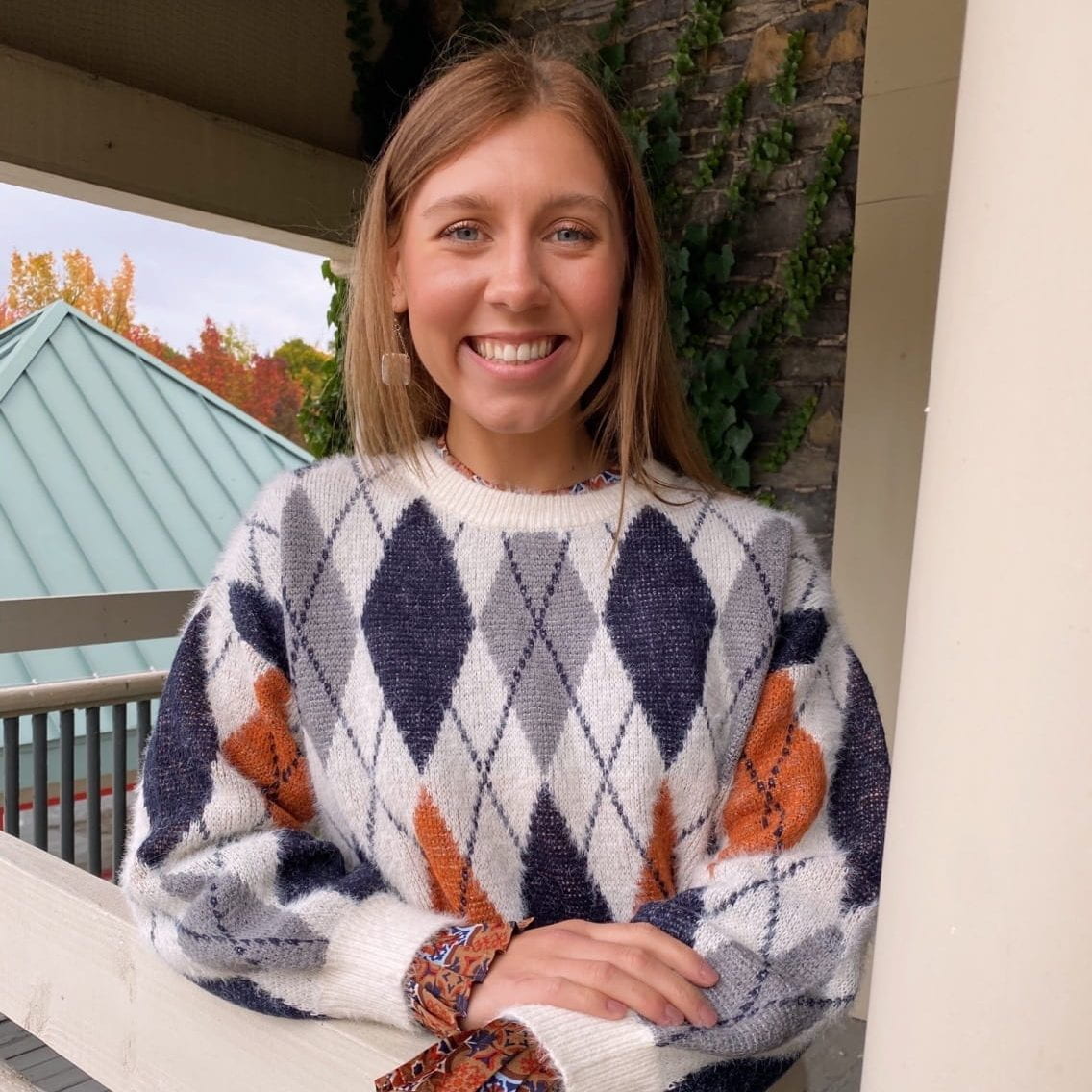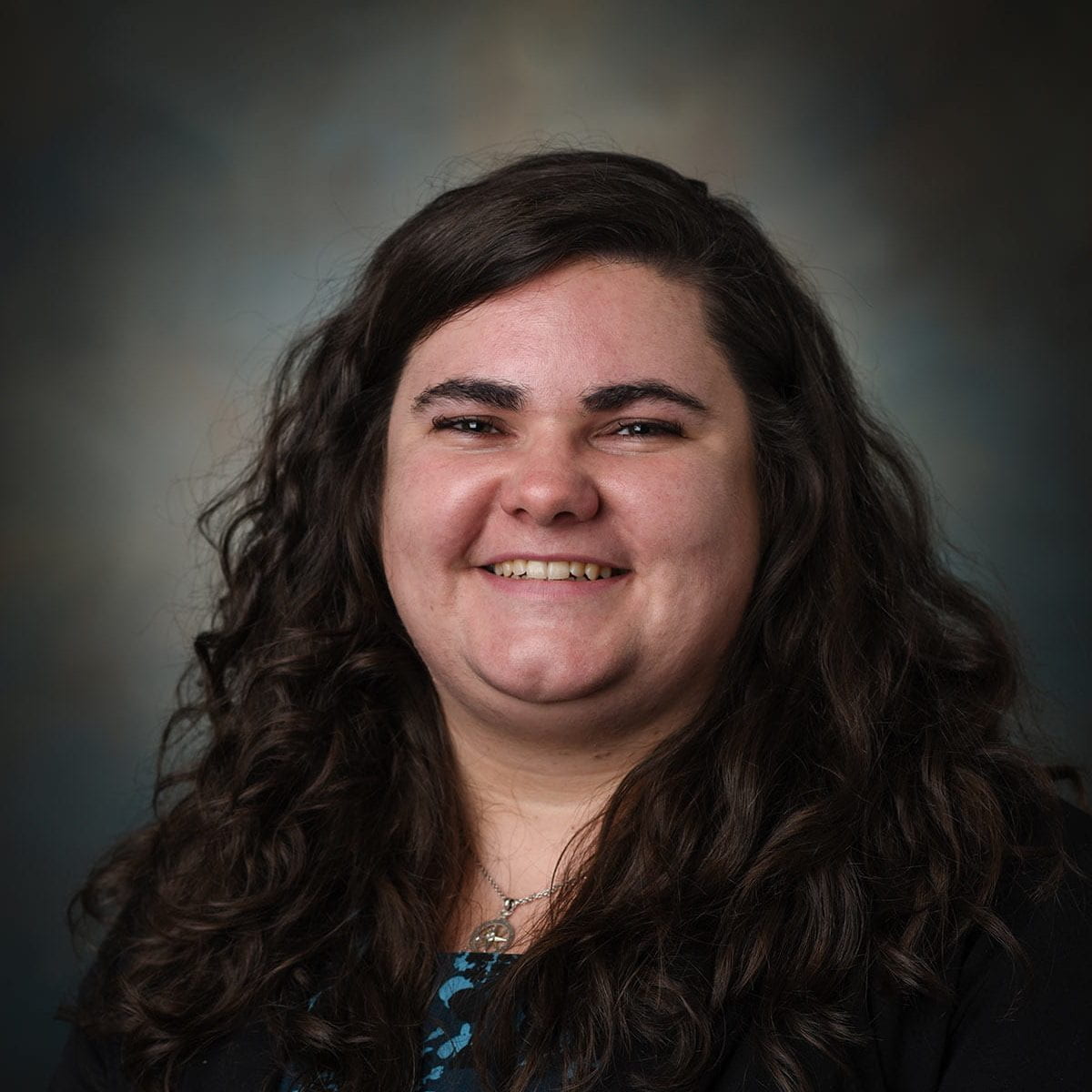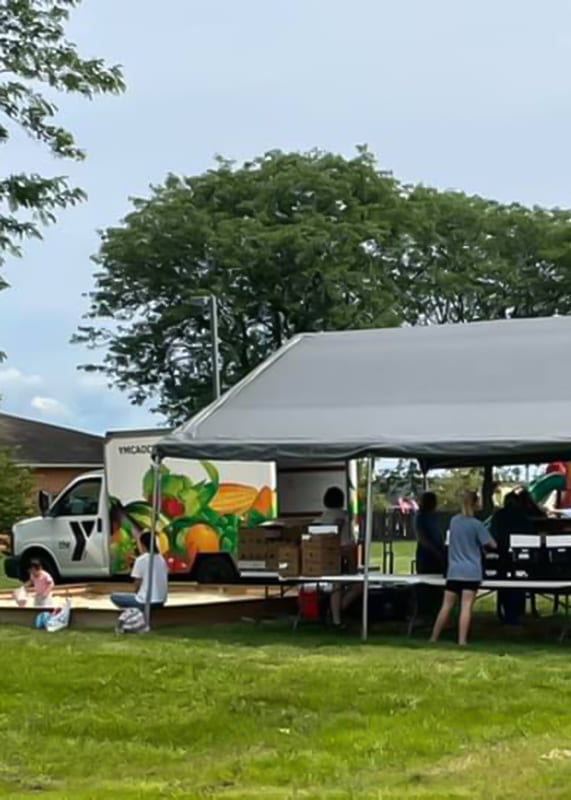
Grocery job led student to anti-hunger advocacy
Madeline Polkinghorn, a junior majoring in Nutritional Sciences with a minor in Human Development and Family Studies, first learned of food insecurity in her community and public health nutrition course. At the time, Polkinghorn was working as a cashier at a local supermarket and was curious how it impacted some of the same people she was interacting with daily.
According to a 2019 Penn State survey of student needs, over 20 percent of University students reported that it was not easy for them to buy fresh fruits and vegetables. Nearly 40 percent reported that fresh produce and balanced meals were not affordable to them.
Food insecurity at Penn State
%
Students indicated that fresh fruits and vegetables are not affordable for them.
%
Students “sometimes” or “often” could not afford to eat balanced meals.
%
Students had to cut the size of their meals or skip meals because there wasn’t enough money for food.
“No matter what your circumstances, you should be able to get food for you and your family,” said Polkinghorn, whose work combatting food insecurity locally has inspired her post-graduation career goals. “I think there’s a lot of stigma around food insecurity, but it can happen to anybody. It’s important to make food as accessible as we can and make sure that people know there is no shame in needing it.”

Author
Mary
Campbell
In her own words: No one should go hungry
Transcript
There’s also a lot of stigma around food insecurity and hunger, so it’s important to make it as accessible as we can and make sure that people know there is no shame in coming to get food. We want to help people, and we want them to know that, when coming to get food, that is a welcoming space.
Polkinghorn became involved with Amit Sharma’s Food Decisions Research Lab (FDRL) in the School of Hospitality Management where she assisted with a project to create a digital food map of Centre County to help individuals facing food insecurity find sources of free and reduced-cost food.
Through the FDRL, Polkinghorn connected with Mel Curtis, the anti-hunger program director for the YMCA of Centre County, who was organizing drive-up food distribution sites during the height of the COVID-19 pandemic.
Polkinghorn volunteered at one of these sites in Boalsburg and was so moved by the experience that she felt she had to do more. Along with Curtis, she began brainstorming ways to combat food insecurity facing Penn State students and the downtown State College community.
“I started reaching out to people, telling them about the food distribution sites, and asking them to come help me,” said Polkinghorn, who recruited her peers in the Student Nutrition Association, the Penn State chapter of the health professions fraternity Phi Epsilon Kappa, and HealthWorks, a peer outreach initiative that promotes health at University Park. “Once people volunteered at a site and saw what it was about, they wanted to keep coming back.”
Curtis, who started the YMCA of Centre County anti-hunger program in 2004, said that while hunger and food insecurity are not going away, the county has developed a vast network of support and volunteers to be able to immediately respond when catastrophe hits. Polkinghorn and the students she helped organize are now an integral part of that response.
“Maddie is a ball of fire, and she has done a phenomenal job gathering people and explaining the issue of food insecurity here,” Curtis said. “For students doing this type of work, it really is a life lesson. It gives them a sense of how to settle in a community, so even when they leave Penn State, they see the value in getting involved.”
“
“I think there’s a lot of stigma around food insecurity, but it can happen to anybody. It’s important to make food as accessible as we can and make sure that people know there is no shame in needing it.”
– Maddie Polkinghorn
”
The initiative developed into an organized group, informally named the Penn State Student Anti-Hunger Program. The program now has over 40 volunteers who assist at food distribution sites in the county, including milk and food distribution events specifically for Penn State students and downtown residents.
With so much interest in the group, Polkinghorn hopes to make it an official Penn State student organization next year. If this happens, the program can live on after she graduates. She also wants the organization to help students understand their role in the larger State College community.
“When you come to Penn State as a student, there is so much to do and so many new things to explore, but I think giving back to the community is a really important part of being here,” said Polkinghorn, who grew up in Bellefonte, Pennsylvania. “It’s important for students to realize that we have to help take care of the community. We may only be here for a short time and then leave, but this is home to so many people.”
Penn State addresses food security
Penn State has taken on a number of initiatives to further identify and support student needs, develop programs for food insecurity prevention and response, and advocate for policies at local, state, and federal levels.
- Enhancements at campus food pantries, including the Lion’s Pantry.
- A digital, visual map to find free and reduced-cost food across Centre County, created by the Food Decisions Research Lab in the School of Hospitality Management.
- Additional need-based student aid through the Renaissance Fund Scholarships and the new LiveOn Student Success Grant program.
- Continued partnership with Swipe Out Hunger.
Photo Credits and Citations
Top photo of Madeline Polkinghorn and photo in audio player – Credit Madeline Polkinghorn
Photo background to Alleviating pandemic-related hunger close to home – Credit Centre County YMCA
Photo header: Getty Images (Hispanolistic)
Infographic data: 2019 Project Cahir Survey
Discover More
Research Impact
No Results Found
The posts you requested could not be found. Try changing your module settings or create some new posts.
In the News
No Results Found
The posts you requested could not be found. Try changing your module settings or create some new posts.
Student Experience
No Results Found
The posts you requested could not be found. Try changing your module settings or create some new posts.
Health Disparities
No Results Found
The posts you requested could not be found. Try changing your module settings or create some new posts.
